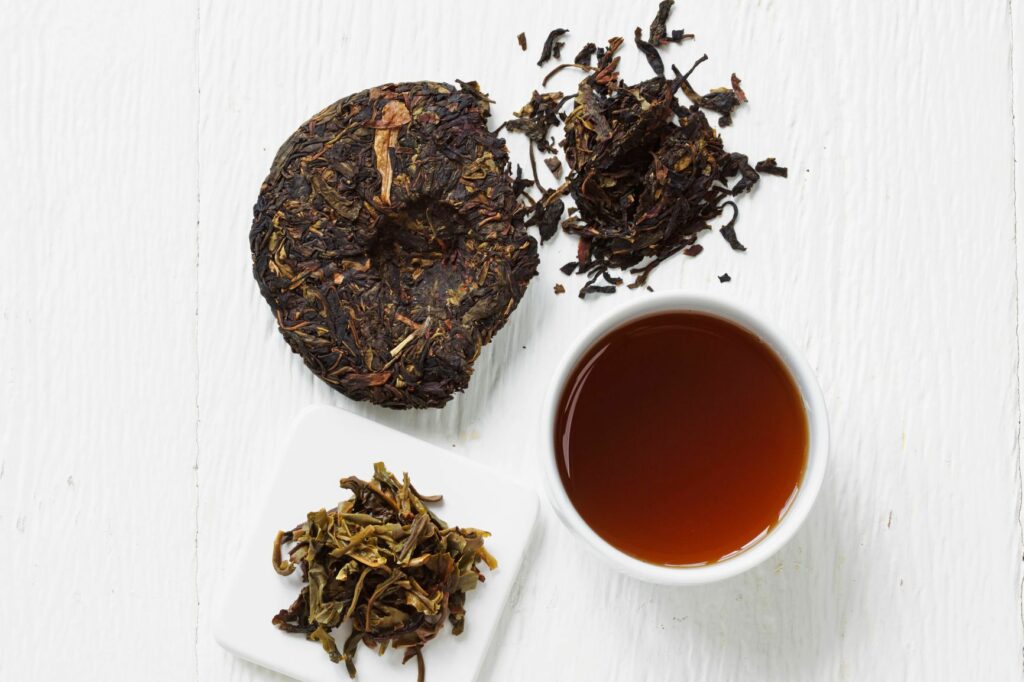Pu-erh tea is a type of fermented tea that originates from the Yunnan province in China. It has a rich history dating back thousands of years and is known for its unique taste and potential health benefits. In this comprehensive guide, we will explore the benefits of Pu-erh tea, recommended dosage, potential side effects, and more.
What is Pu-erh Tea?
Pu-erh tea is made from the leaves of the Camellia sinensis plant, the same plant used to produce green tea, black tea, and oolong tea. However, what sets Pu-erh tea apart is its fermentation process. The tea leaves are first withered and then subjected to microbial fermentation, which gives Pu-erh tea its distinct flavor and characteristics.
Health Benefits of Pu-erh Tea
- Digestive Health: Pu-erh tea has been traditionally used to aid digestion. It is believed to stimulate the production of digestive enzymes, promote healthy gut bacteria, and reduce bloating and indigestion.
- Weight Management: Some studies suggest that Pu-erh tea may help with weight management. It is thought to increase metabolism, enhance fat burning, and reduce the absorption of dietary fat.
- Heart Health: Pu-erh tea contains compounds called flavonoids and antioxidants that may help reduce cholesterol levels and improve heart health. Regular consumption of Pu-erh tea has been associated with lower blood pressure and reduced risk of heart disease.
- Antioxidant Properties: Like other types of tea, Pu-erh tea is rich in antioxidants. These compounds help neutralize harmful free radicals in the body, protecting cells from oxidative stress and reducing the risk of chronic diseases.
- Mental Alertness: Pu-erh tea contains caffeine, which can enhance alertness, concentration, and focus. It also contains an amino acid called L-theanine, which has calming effects and may help improve cognitive function.
Recommended Dosage
The optimal dosage of Pu-erh tea can vary depending on individual factors such as age, health status, and caffeine sensitivity. As a general guideline, it is recommended to consume 1-3 cups of Pu-erh tea per day. Each cup typically contains around 30-60 milligrams of caffeine, so it’s important to be mindful of your overall caffeine intake and how it affects your body.
It’s worth noting that Pu-erh tea can have a stronger flavor and higher caffeine content than other types of tea. If you are sensitive to caffeine or have any underlying health conditions, it is advisable to consult with a healthcare professional before incorporating Pu-erh tea into your routine.
Side Effects and Precautions
While Pu-erh tea is generally considered safe for consumption, it’s important to be aware of potential side effects and take necessary precautions:
- Caffeine Sensitivity: Pu-erh tea contains caffeine, which can cause side effects such as restlessness, anxiety, insomnia, and increased heart rate in individuals sensitive to caffeine. Limit your consumption if you experience any of these symptoms.
- Stomach Discomfort: Some people may experience stomach discomfort, such as acid reflux or stomachache, after drinking Pu-erh tea. If you have a history of gastrointestinal issues, it’s advisable to consume Pu-erh tea in moderation and monitor your body’s response.
- Interactions with Medications: Pu-erh tea may interact with certain medications, including blood thinners, anticoagulants, and medications for high blood pressure. If you are taking any medications, consult with your healthcare provider to ensure there are no potential interactions.
- Pregnancy and Breastfeeding: Due to its caffeine content, it’s generally recommended for pregnant women and breastfeeding mothers to limit their intake of Pu-erh tea. Excessive caffeine consumption can potentially affect fetal development or pass into breast milk.
How to Prepare Pu-erh Tea
To prepare Pu-erh tea, follow these steps:
- Boil water and let it cool for a few minutes to around 95°C (203°F).
- Place Pu-erh tea leaves or a tea cake in a teapot or gaiwan.
- Rinse the tea leaves by pouring hot water over them and immediately discarding the water. This helps remove any impurities and wakes up the leaves.
- Add the hot water to the tea leaves and let them steep for 2-5 minutes, depending on your preference. You can adjust the steeping time to make the tea stronger or milder.
- Pour the tea into cups and enjoy. Pu-erh tea can be steeped multiple times, with each infusion offering a slightly different flavor profile.
Conclusion
Pu-erh tea is a unique and flavorful tea with potential health benefits. It is known for aiding digestion, supporting weight management, promoting heart health, and providing antioxidant properties. However, it’s essential to consume Pu-erh tea in moderation and be aware of any potential side effects or interactions with medications. As with any dietary change, it’s recommended to consult with a healthcare professional before incorporating Pu-erh tea into your daily routine. Enjoy the rich flavors and potential benefits of Pu-erh tea, and savor this ancient beverage.

